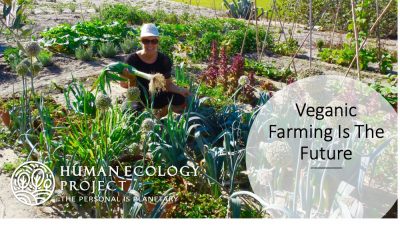Veganic Farming Is The Future

At this point in time veganic sustainable agriculture must become the future. Small-scale farmers are vital to domestic food security and have a guaranteed and growing market for staple crops. The UK produces 24% less food than it consumes and will be in dire straits and under escalating problems without the ability to feed itself.
Over the last 20 years, the UK's self-sufficiency for domestically-grown food has fallen drastically, while yields of its most important staple crop, wheat, have not increased for at least the last 20 years. The UK's ability to feed itself is threatened by “complacency” over the extreme weather driven by climate change and increasing competition for food as the world's population grows.
What's the Problem?
Heavy dependence on imported soybeans to feed livestock and dairy herds with almost 90% of the imports coming from Brazil. The other major issue that requires addressing is the fast-rising demand for protein in China, India and elsewhere meaning competition for soybeans is a significant strategic risk.
Emphasis must be on climate smart agriculture in the short-term, but in the years to come the focus will be on switching crops. As climate change affects commercial crops, alternatives will have to be sought out. For example, in Mexico, the government is looking to varieties of cocoa to replace coffee crops, which may not be suitable to grow by 2025 due to blight and heat as a consequence of climate change.
With the right assistance and packages of better management practice and inputs, switching crops could be an opportunity for smaller farmers struggling with current crops to leapfrog previous performance and become more productive. Moving to adapted crop varieties that are more resilient to climate change is feasible.
What's The Solution?
Another impressive and inspirational example over the last few decades are farmers in Niger who have managed the natural regrowth of native Faidherbia trees across 5m hectares. The Faidherbia fixes nitrogen in the soil, protects fields from wind and water erosion and contributes organic matter to soils when its leaves drop. Compared to conventional farms in the country, yields of maize in these agroforestry systems can be doubled and farmers in Ethiopia, Kenya, and Zambia are taking note.
Small scale farmers growing amazing produce to feed the world, YES PLEASE... I am going to be one. The solution is at hand, everyone can be a part of reversing climate change. It's a very exciting prospect. Our Human Ecology Projects wish is to fund a small scale operation on veganic farming so everyone can get involved.
In good health


